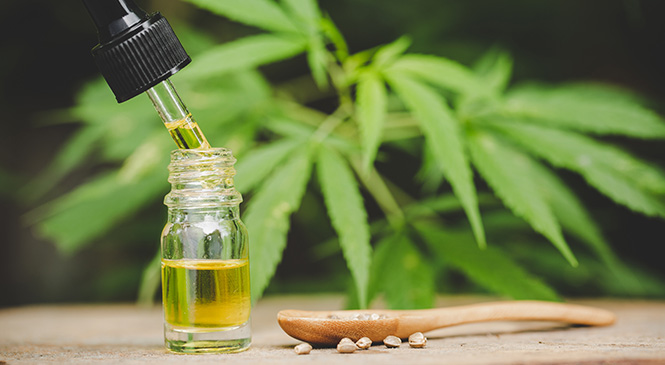Work Drug Safe
What You Need to Know About CBD

This information is provided for educational purposes only. Reader retains full responsibility for the use of the information contained herein.
Cannabidiol, more commonly known as CBD, has spiked in popularity over the last few years. However, one consequence of a quick rise to fame is a great deal of misunderstanding, misinformation, and lingering questions about the substance.
What Is CBD and How is it Used?
CBD is a compound found in the cannabis plant, and it can be found in both hemp and marijuana. It has become extremely popular recently as a medical treatment for various ailments, most notably as an effective treatment for childhood seizures.1 CBD is reported to alleviate anxiety, pain, insomnia, nausea, and more. There is limited scientific research on the correct dosage of CBD, the potential side effects of CBD use, or how it interacts with other drugs.2 Historically, there is a significant amount of research into the treatment of childhood seizures. More recent studies have looked at CBD to treat diabetes, Crohn’s, hypertension, fatty liver disease and more, but significant research has not yet been completed.
Because CBD products are not regulated, there is no easy way to tell how much THC a product may contain.
CBD is different than THC, also known as tetrahydrocannabinol. Both are compounds found in cannabis, but THC is the chemical that causes the euphoric high associated with marijuana use. CBD itself does not produce a high, and it has no recreational use, but CBD and THC can be found in both marijuana and hemp.3 In the United States, hemp, by definition, contains less than 0.3% THC, and marijuana contains more than 0.3% THC.4
CBD’s Legality, Regulation, and Safety
Because CBD comes from cannabis, it is unregulated by the federal government. Apart from the prescription drugs Epidiolex®, Marinol, and Syndros, marijuana products (either plant-based or synthetic) are all considered illegal by the federal government and thus are not overseen by the Food and Drug Administration (FDA) or other federal bodies.5 Hemp products are no longer treated with as much rigidity as marijuana products by the federal government. However, they are still not approved for consumption in the United States via food products.6
While CBD products are often marketed as containing no THC or low THC, government agencies are not validating these claims. There are also no required checks on how much CBD is contained in these products.
There has already been anecdotal evidence that CBD products are not always what they claim to be. Multiple people have sued CBD companies after consuming CBD products labeled as zero THC and subsequently tested positive for THC.7 Also, stories have emerged of people vaping CBD and suffering health emergencies, often when the CBD product is laced with other substances, such as synthetic marijuana.8
CBD and Drug Testing
CBD is not screened for on a standard drug test, but CBD products can still trigger a positive drug test if other chemicals, the most common being THC, are contained in the product. Because CBD products are not regulated, there is no easy way to tell how much THC a product may contain. Drug test results cannot differentiate between a THC-positive from CBD products and a THC-positive from marijuana use.
Marijuana use has received legal protections on the state level in recent years. Many states have passed laws that prohibit employers from taking adverse employment action against medical marijuana-using employees unless they pose a safety risk or are under the influence while at work. However, CBD use has not yet received widespread protections.
The United States Navy and other armed force branches have reiterated their hemp and CBD policy by reminding sailors and Marines that CBD and hemp products are prohibited and even took steps to inform them why. The Navy released a statement explaining:
“Commercially-available hemp products, including CBD, have not been inspected by the FDA and therefore have not been proven to diagnose, treat, prevent or cure any illness. Some of these products do not list all ingredients, making it impossible to know definitively how much CBD, THC or other synthetic cannabinoids they may contain. Use, which is defined as oral ingestion, intravenous use, smoking/vaporization or any other method through which hemp-derived products may enter the body, could expose the user to THC. It is possible to test positive for THC on a urinalysis by using a CBD or hemp product. It can be impossible to determine where a CBD or hemp product was manufactured and what level of THC it may contain. Even trace amounts of THC can accumulate in the body and be detected in a urinalysis screening.”9
This policy and statement benefit from clarifying the Navy’s policy on CBD use and helps to inform those who may not be clear about CBD, THC, and drug testing.
Conclusion
The landscape of CBD use is an unfamiliar one as of now. Science and regulations are struggling to catch up to the substance’s popularity. Regardless of the purported benefits, safety should be at the forefront of everyone’s mind when considering the realities of CBD use.
References
- Ben-Zeev, M.D., Bruria, Medical Cannabis for Intractable Epilepsy, Rambam Maimonides Medical Journal (January 30, 2020), https://www.ncbi.nlm.nih.gov/pmc/articles/PMC7000162/
- Millar SA, Stone NL, Bellman ZD, Yates AS, England TJ, O’Sullivan SE. A systematic review of cannabidiol dosing in clinical populations. Br J Clin Pharmacol. 2019 Sep; 85(9): 1888-1900.
- Grinspoon, MD Peter. “Cannabidiol (CBD): What we know and what we don’t.” Harvard Health Publishing, 4 April 2024. https://www.health.harvard.edu/blog/cannabidiol-cbd-what-we-know-and-what-we-dont-2018082414476.
- Cannabis and Public Health: About CBD.” Centers for Disease Control (CDC), 31 Jan. 2025. https://www.cdc.gov/cannabis/about/about-cbd.html#:~:text=The%20U.S.%20Food%20and%20Drug,may%20not%20be%20FDA%20approved.
- FDA Regulation of Cannabis and Cannabis-Derived products, including Cannabidiol (CBD).” United States Food and Drug Administration (FDA), 16 July 2024, https://www.fda.gov/news-events/public-health-focus/fda-regulation-cannabis-and-cannabis-derived-products-including-cannabidiol-cbd#:~:text=With%20the%20exception%20of%20Epidiolex,population%2C%20whether%20pediatric%20or%20adult.
- Id.
- Gill, Lisa L., Can you take CBD and pass a drug test?, Consumer Reports (May 15, 2019), https://www.consumerreports.org/cbd/can-you-take-cbd-and-pass-a-drug-test/
- Mohr, Holbrook, Some CBD vapes contain street drugs instead of the real thing, AP News (September 16, 2019), https://www.apnews.com/7b452f4af90b4620ab0ff0eb2cca62cc
- Chief of Naval Personnel Public Affairs, Navy releases hemp policy, Navy News Service (August 7, 2019), https://www.navy.mil/Press-Office/Press-Releases/display-pressreleases/Article/2238613/navy-releases-hemp-policy/




